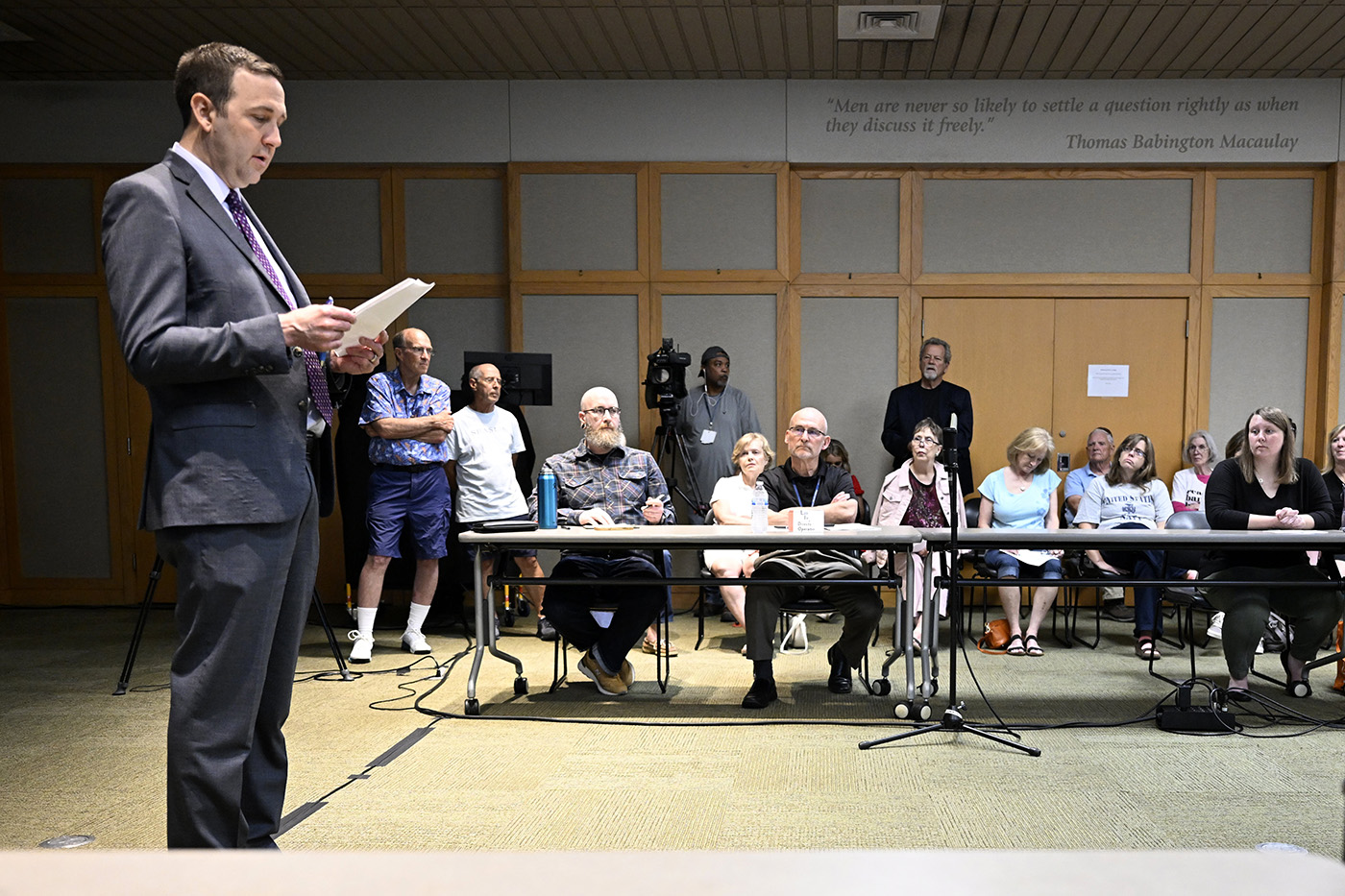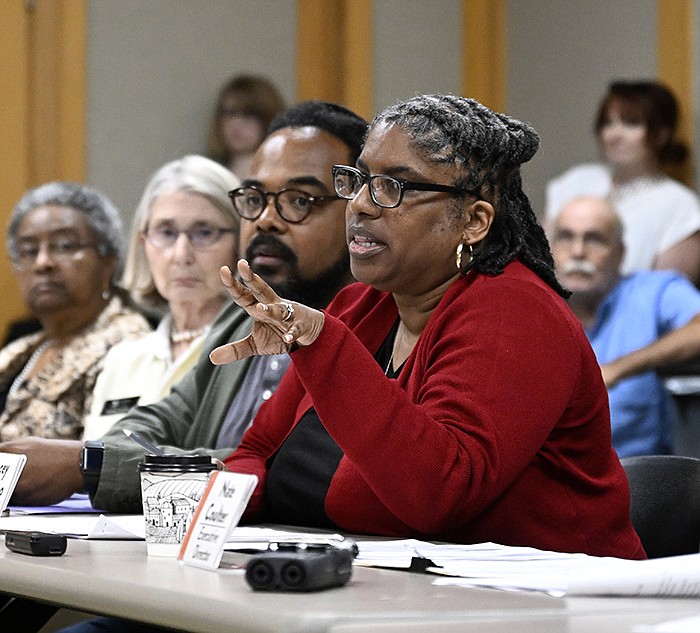The Central Arkansas Library System's board of directors in a voice vote Thursday authorized a lawsuit in federal court challenging elements of Act 372, a new state law that exposes library personnel to criminal prosecution and allows decisions regarding the appropriateness of items held in the collection to be appealed to local elected officials.
The board's action clears the way for a First Amendment lawsuit that is likely to include as co-plaintiffs a number of other parties, including two bookstores, WordsWorth Books in Little Rock and Pearl's Books in Fayetteville, and several individuals, including Central Arkansas Library System patrons.
Act 372 is scheduled to take effect Aug. 1, barring a judicial hold. The measure's lead sponsor was Sen. Dan Sullivan, R-Jonesboro.
The legislation establishes a new Class A misdemeanor of furnishing a harmful item to a minor and removes from state law language shielding employees of schools and public libraries from prosecution for disseminating material claimed to be obscene.
Additionally, it sets new processes for citizens to challenge the appropriateness of material held in school or public libraries.
A successful challenge could result in an item being relocated to an area inaccessible to minors. Individuals could appeal a decision not to relocate an item to the local school board, in the case of a school library, or quorum court or city council, in the case of a county or municipal library.
The law also allows libraries to disclose confidential library records to the parents or legal guardians of patrons under 18.
At an April 27 meeting, the library system's board voted to move ahead with further legal analysis in anticipation of a lawsuit.
The lawsuit is expected to challenge the constitutionality of the two sections of the law that establish the new Class A misdemeanor and the material-challenge procedure pertaining to public libraries, according to John T. Adams, an attorney representing the library system who addressed board members Thursday before the vote.
Adams, who works for the law firm Fuqua Campbell, wrote a memo addressed to board members earlier this week that laid out the legal case behind a First Amendment challenge.
Act 372 incorporates a "harmful to minors" definition from an existing Arkansas statute that "covers substantially more material than the constitutional category of obscenity applicable to adults," he wrote.
The new law represents "a content-based restriction" broader than a 2003 Arkansas prohibition on displaying material harmful to minors that a federal judge found to be unconstitutional in 2004, Adams wrote.
"On its face, the prohibition sweeps exceedingly broadly," Adams wrote of the new Class A misdemeanor offense. "For example, a book found harmful to a seven-year-old would be illegal to loan to a 17-year-old, and illegal for CALS even to 'make available' by keeping on the shelves in areas accessible to patrons under the age of 18."
Adams wrote that the challenge procedure for public libraries laid out in the law violates the First Amendment in three ways: by imposing an unconstitutional prior restraint, serving as a "de facto licensing scheme" that denies patrons adequate opportunity for prompt judicial review of local governing bodies' decisions and giving "undue discretion" to those governing bodies to make decisions without criteria or a record of their reasoning in a way that is unconstitutionally vague.
The Central Arkansas Library System already employs a policy that allows residents of the library system's service area to object to items in the collection or web sites accessible through a library computer. Appeals go to the library system's board.
Right now, there are around 16 parties that would like to join the library system in challenging the law, Adams told board members Thursday.
He had hoped to have a draft complaint ready to show them Thursday and then file today, but was not ready to circulate it because of the interest in the case and a desire to get the facts right, Adams said.
During the public comment portion of the meeting, Luke McCoy, a Pulaski County justice of the peace, discouraged board members from challenging Act 372, which he noted was passed by comfortable majorities in both chambers.
McCoy argued that the law simply prohibits giving or sending obscene sexual material to a child and creates a more transparent process for questioning or challenging an item in the collection.
Angela Hunter urged board members to initiate or participate in a lawsuit against the law. She said the legislation micromanages librarians and described the Central Arkansas Library System's existing system for handling challenges to material as "robust."
Alexis Sims, the Maumelle representative on the board, raised concerns that board members did not have a draft complaint to review and had been provided the legal memo fewer than 48 hours earlier.
She referred to the legislative majority that enacted the law and suggested it was indicative of a desire to keep children safe.
"As the granddaughter of Cuban political refugees, I am not for book banning," Sims said. "I am very proud of the CALS collection. As a homeschool mom, I want it to be robust."
Likewise, she encouraged board members to challenge their own thinking and not simply give in to "political discourse, but to think through the ramifications."
Because other parties appeared to be ready to challenge the law, the library system could deploy patrons' dollars elsewhere and use the energy of its staff and leadership to fundraise for the much-needed Main Library renovations, as opposed to a legal case, Sims said.
Sims also called it "concerning" that a footer across the library system's website directed readers to a donation link to fight Act 372 before the board had approved the case.
Robert Brown, a Pulaski County representative on the board and former associate justice of the Arkansas Supreme Court, said a judicial determination was needed with regard to the law's language on items harmful to minors.
The library system was "kind of flying blind in a sense" without clarity from a judge, Brown said.
Dustin McDaniel, a Pulaski County representative on the board who served as Arkansas attorney general from 2007 to 2015, acknowledged that litigation is always a last option and said he considers Sullivan to be a great friend.
But McDaniel added that to the extent criminal charges are associated with the question of what is harmful, it would be "woefully negligent" for the library system not to get clarification from a court before subjecting any employees to the possibility of legal peril.
Librarians are not required to be lawyers, and "they should not be subjected to that level of risk," McDaniel said. "It's our duty to know what they should and should not do before we ever put them at any risk, and the only way to do that is to find out through the court system."
Sims was the lone audible "no" vote. Esperanza Massana-Crane, a state employee through the Arkansas Economic Development Commission, audibly registered her abstention from the vote.
 John T. Adams, an attorney for the Central Arkansas Library System, presents the proposal to authorizelitigation challenging Act 372 during the system’s board of directors meeting Thursday at the CALS Main Library in Little Rock. In a memo to the board earlier this week, Adams said the new law violates the First Amendment in three ways. (Arkansas Democrat-Gazette/Stephen Swofford)
John T. Adams, an attorney for the Central Arkansas Library System, presents the proposal to authorizelitigation challenging Act 372 during the system’s board of directors meeting Thursday at the CALS Main Library in Little Rock. In a memo to the board earlier this week, Adams said the new law violates the First Amendment in three ways. (Arkansas Democrat-Gazette/Stephen Swofford)